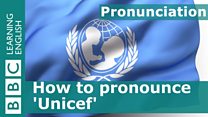Unit 22: English You Need
Exams, news, pronunciation, teachers' tips, learners' questions
Select a unit
- 1 English You Need
- 2 English You Need
- 3 English You Need
- 4 English You Need
- 5 English You Need
- 6 English You Need
- 7 English You Need
- 8 English You Need
- 9 English You Need
- 10 English You Need
- 11 English You Need
- 12 English You Need
- 13 English You Need
- 14 English You Need
- 15 English You Need
- 16 English You Need
- 17 English You Need
- 18 English You Need
- 19 English You Need
- 20 English You Need
- 21 English You Need
- 22 English You Need
- 23 English You Need
- 24 English You Need
- 25 English You Need
- 26 English You Need
- 27 English You Need
- 28 English You Need
- 29 English You Need
- 30 English You Need
Session 5
Learners' Questions
Welcome to Learners' Questions - the series where we answer your queries about the English language. What will this week's learner question be?
Activity 1
Learners' Questions
Better off
Mariano in Spain says: How do I understand the sentence we are better off than you. Does it always refer to questions related to money?
Watch the video and complete the activity

Dan
Hi guys! Dan from BBC Learning English here with this week's Learner Question. Find out what it is after this.
OK! This week's Learner Question comes from Mariano from Spain, who writes: How do I understand the sentence we are better off than you. Does it always refer to questions related to money? For example, we have got more money than you. I’m not sure. Please help. Ok Mariano. Here’s your explanation.
So, well off is an adjective and it relates mainly to money matters. If you are well off, you may not be exactly rich but you certainly have enough money to live well and comfortably. For example, they’re quite well off. They have their own flat and they have their own car.
The comparative form of well off is better off, and this is used to talk about the varying degrees of wealth that different people have. For example, we’re not as well off as the Jones’s. They are definitely better off than we are.
To be better off also has another meaning, and it means to be in a better situation. It’s mostly used in conditional patterns. For example, if you’ve got heavy bags, you’re better off taking a taxi. Or, it says on the sign over there that the motorway is closed so we’re better off going by a different route.
Finally, we can talk about the better off. When we add the to an adjective, we create a group noun. So the better off is a group of people who are better off than us. For example, the better off should pay a higher rate of tax, whereas the worse off should pay no tax at all.
I hope that answers your question Mariano. Thank you very much for writing to us. If anybody else out there has a question for Learners’ Questions, you can email us on: learning.english@bbc.co.uk. Please remember to include Learners’ Questions in the subject box and your name and where you’re writing from. We get a lot of emails, guys, and we can’t possibly answer all of them, but we do read every single one. And for more information, go to our website: bbclearningenglish.com. That’s it for this week’s Learners’ Questions. Thank you very much for joining us. I’ll see you next time. Bye!
___________________________________________________________________
Did you like that? Why not try these?
___________________________________________________________________
Summary
Well off
Well off is an adjective and it relates mainly to money matters. If you are well off, you may not be exactly rich but you certainly have enough money to live well and comfortably.
They’re quite well off. They have their own flat and they have their own car.
Better off
The comparative form of well-off is better off, and this is used to talk about the varying degrees of wealth that different people have.
We’re not as well of as the Jones’s. They are definitely better off than we are.
To be better off also has another meaning, and it means to be in a better situation. It’s mostly used in conditional patterns.
If you’ve got heavy bags, you’re better off taking a taxi.
It says on the sign over there that the motorway is closed so we’re better off going by a different route.
We can talk about the better off. When we add the to an adjective, we create a group noun. So the better off is a group of people who are better off than us.
The better off should pay a higher rate of tax, whereas the worse off should pay no tax at all.
To do
Try our quiz to see what you've learned about this topic.
Learners’ Questions Quiz
4 Questions
Decide if these sentences are correct or incorrect
Help
Activity
Decide if these sentences are correct or incorrect
Hint
Is well off a comparative adjective? What is its form?Question 1 of 4
Help
Activity
Decide if these sentences are correct or incorrect
Hint
Is this a comparison? Is better off a comparative? Is there a 'than'?Question 2 of 4
Help
Activity
Decide if these sentences are correct or incorrect
Hint
Is the speaker comparing themselves to TIm or are they saying that Tim is the better option of the two candidates?Question 3 of 4
Help
Activity
Decide if these sentences are correct or incorrect
Hint
Adding 'the' to an adjective makes a group noun. There are several group nouns here. Are they used correctly?Question 4 of 4
Excellent! Great job! Bad luck! You scored:
End of Session 5
Well, that's it for this unit! Join us again in Unit 23 for more Exam Skills, News Review, Pronunciation in the News, The Teachers' Room and Learners' Questions!
Session Vocabulary
well off
able to live comfortably
better off
in a better economic position than someone, or
in a better position or situationthe better off
those people who have more money


